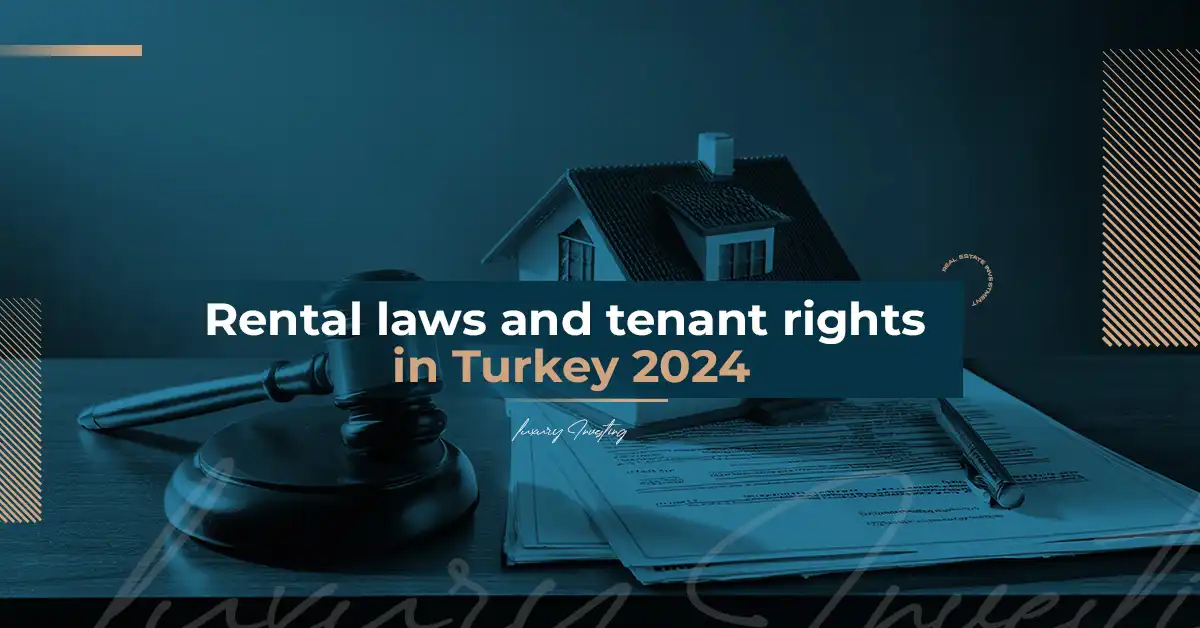
Rental laws and tenant rights in Turkey 2024
Table of Contents
The process of renting and leasing in Turkey is governed by a variety of laws aimed at protecting the rights of both property owners and tenants. These laws have been updated in recent years to meet the changing needs of the market. In this article, we will review the main laws related to renting and tenant rights in Turkey for the year 2024, providing examples and statistics for a comprehensive understanding.
Turkish Civil Code
The Turkish Civil Code is considered the primary source for regulating lease agreements. This code outlines the rights and obligations of both the tenant and the landlord and sets the steps that should be followed in case of disputes. These laws regulate all issues related to lease renewal, eviction, and various other problems. The lease law in Turkey precisely governs the framework of dealings concerning rental agreements and all details of the rental relationship between the tenant and the property owner, and it also specifies financial transactions between the parties.
The key provisions in this law include:
- Lease agreement: An official lease agreement must be signed between the landlord and the tenant, specifying the terms of the lease, such as its duration, value, and other property-related details. The contract duration for residential properties is typically six months or one year, while for commercial properties it is five years or as agreed upon.
- Lease duration: Generally, lease terms are automatically renewable unless either party notifies the other of their intent not to renew at least thirty days prior to the lease's expiration. The duration can be annual or daily, depending on the type of rental (touristic, annual).
- Rent value: The rent must be determined fairly and agreed upon by both parties, with the annual increment specified according to the rate set by law.
- Annual rent increase: The law regulates the annual increase in rent based on the Consumer Price Index (CPI). It stipulates that the increase should not exceed the percentage specified by the government.
- Security deposit: The property owner is entitled to request a security deposit from the tenant as compensation for any damages that may occur during the lease period. The deposit usually amounts to two months' rent.
- Property modifications: The tenant is not allowed to make any changes to the property without written consent from the owner. Additionally, subleasing the property without the owner's written consent is prohibited. If this occurs, the owner has the right to file a lawsuit against the tenant for unauthorized use. Through this lawsuit, the owner can evict the tenant within six months.
- Responsibility for costs: The rental law states that any financial costs unrelated to the use of the property fall on the property owner. If the tenant pays these costs, they have the right to deduct them from the monthly rent. Such payments often cause disputes between the landlord and tenant due to a lack of understanding of rental laws in Turkey. Regarding property expenses and their payment responsibilities, the following applies:
- The exterior painting of the apartment is the owner's responsibility, although an agreement can be made in the contract to the contrary.
- If there are any issues within the apartment before the tenant takes possession, the tenant can demand that the landlord carry out maintenance and repairs. Alternatively, they can agree to cover the cost themselves and deduct it from subsequent rent payments.
Rent increase rate in Turkey 2024
Rent increases in Turkey for 2024 are determined annually based on the rate specified in rental laws. This increase is calculated based on Turkey's inflation rate, which is assessed by the Turkish Statistical Institute (TUIK). A cap was set to protect tenants, limiting rent increases to no more than 25% for lease agreements renewed between June 11, 2022, and July 1, 2024. With this limitation, the rent increase rate for residential leases could not exceed 25%, and any contracts exceeding this rate were deemed invalid.
As of the beginning of July, the previous decision, which capped rent increases at 25%, has expired. According to the new data from TUIK, rent increases will now be determined based on the officially announced annual inflation rate, which was 65.07% for June of the previous year. This measure affects residential lease agreements and business premises set for renewal during this month, reflecting a significant increase in rental costs for tenants in Turkey.
*Click the link below to calculate the rent increase rate for periods after January 1, 2024
https://www.hesapkurdu.com/konut-kredisi/h/kira-artisi-hesaplama
Tenant rights in Turkey
- Tenants have the right to live in accommodation that meets safety and health standards, including rights such as ensuring there are no electrical wiring issues or water leaks.
- Tenants have exclusive rights to use the property without unreasonable interference from the landlord. The landlord is required to notify the tenant in advance before any visit to the property.
- The landlord is obligated to carry out necessary repairs that affect the habitability of the property, such as plumbing and heating issues.
- Tenants are legally protected against arbitrary eviction. The landlord must follow legal procedures and provide predetermined notices if eviction is necessary.
- Annual rent increases are regulated based on the Consumer Price Index (CPI), and landlords cannot exceed the legally prescribed rate.
- The landlord is responsible for major repairs to the property, such as leaks and structural problems. The tenant is only responsible for minor repairs resulting from daily use. Repair and maintenance disputes are among the most common issues between tenants and landlords. For example, if a landlord refuses to fix a broken heater in winter, the tenant can appeal to local authorities to enforce their right to suitable housing.
- If a landlord increases the rent beyond the legally prescribed rate, the tenant has the right to legally contest and appeal this increase in court.
- At the end of the lease agreement, the tenant is entitled to reclaim the security deposit unless there are damages to the property beyond normal wear and tear.
Home owner Rights in Turkey
- One of the primary rights of a home owner is the collection of rent. The home owner is entitled to set the rent according to the signed agreement and demand payment according to the deadlines specified in the contract.
- The home owner can terminate the lease in specific cases, such as non-payment of rent or the tenant violating the terms of the contract. The tenant must be notified in advance, and legal procedures must be followed.
- The home owner has the right to increase the rent annually in line with the Consumer Price Index (CPI). Turkish laws impose a maximum limit on the increase rate, and this increase should be specified in the contract.
- The home owner has the right to enter the property to perform necessary maintenance or inspections, provided they notify the tenant in advance and do not infringe on their privacy.
- If the tenant causes intentional damage or neglects the property beyond normal wear and tear, the home owner is entitled to request compensation from the tenant for repairs.
Tenant obligations toward the home owner in Turkey
When renting a property in Turkey, whether residential or commercial, tenants must adhere to certain obligations towards the home owner. These duties are part of the legal contract established between both parties and align with Turkish laws governing tenant-owner relationships. Here is a breakdown of these obligations:
- Compliance with Contract Terms:
- Timely payment: Paying rent on time is one of the tenant's primary responsibilities. The contract usually specifies a set date for each monthly payment that the tenant must adhere to.
- Lease period adherence: Tenants must respect the lease duration specified in the contract and should not vacate the property before the end of this period without prior agreement with the owner.
- Property Maintenance:
- Minor maintenance and repairs: Tenants are expected to keep the property in good condition and carry out minor repairs that do not require the owner's intervention, such as replacing light bulbs or fixing leaking taps.
- Reporting damages: Tenants should immediately inform the owner of any major damage to the property so that necessary actions can be taken.
- Respecting Neighbors and Local Laws:
- Noise and disturbance: Tenants must maintain quiet and respect neighbors, especially during hours mandated by local laws.
- Adherence to local laws: Tenants must comply with all local laws and regulations, including those concerning cleanliness, waste disposal, and the use of communal facilities.
- Use of Property According to the Contract:
- Agreed usage: If the contract specifies the property's use solely for residential purposes, the tenant should not use it for commercial or other unspecified purposes.
Home owner obligations toward tenants in Turkey
In the Turkish real estate market, tenants have a set of rights that home owners must respect and comply with. These obligations include legal and ethical duties aimed at ensuring a fair and secure rental relationship for both parties. Below are some of the key responsibilities of home owners toward tenants:
- Providing Habitable or Usable Property:
- Legal framework: Home owners must ensure that the property rented is habitable or suitable for use (if commercial), in accordance with local laws and regulations. This includes ensuring the quality of infrastructure and the safety of essential amenities.
- Necessary maintenance and repairs: It is the home owner's responsibility to conduct regular maintenance and necessary repairs related to the property's foundations, plumbing, heating, air conditioning, and other essential facilities.
- Adherence to Contract Terms:
- Respecting lease duration: Home owners must honor the lease period specified in the contract and should not attempt to terminate it prematurely unless there is a legitimate legal reason.
- Guaranteeing residential stability: The home owner should not disturb the tenant or make surprise visits without prior notice, except in emergencies or as previously agreed.
- Transparent Financial Dealings:
- No unjustified rent increases: According to Turkish law, home owners should not increase the rent during the contract period unless explicitly permitted by a contractual clause.
- Pre-Delivery Operations and Maintenance:
- Inspection and assessment: Before handing over the property to the tenant, the home owner must ensure all facilities are in proper working order. This includes checking the electrical system, plumbing, heating and air conditioning, and other equipment such as elevators.
- Ensuring cleanliness and suitability: The property must be clean and suitable for residential or commercial use as agreed. Any existing damages or defects should be repaired before handover.
- Meeting safety standards: For example, ensuring that smoke detectors or fire extinguishing systems are functioning properly.
- Return of Security Deposit in the Absence of Damages:
- Final inspection with both parties: At the end of the lease, an inspection of the property should be conducted with both the home owner and tenant present to assess the property’s condition.
- Returning the security deposit: If there are no damages or breaches, the home owner is obligated to return the security deposit paid by the tenant at the start of the lease. This should be done within a reasonable timeframe specified in the contract or according to local customs.
- Amicable settlement: In case of minor damages that do not warrant a deduction from the deposit, the home owner and tenant may amicably agree on a suitable resolution and compensation if necessary.
Frequently asked questions
Maintenance costs vary depending on the type of property and the residential complex. They typically include cleaning costs, security, gardening, and shared facilities such as swimming pools or sports clubs.
Yes, foreigners can rent out their properties in Turkey, and good rental income can be achieved, especially from tourist properties in major tourism cities like Istanbul, Antalya, and Trabzon.
The rental income depends on the location of the property and its proximity to tourist or commercial areas. Major cities like Istanbul and Antalya generally yield higher returns due to increased demand.
The rental contract is renewed through an agreement between the landlord and tenant on the new terms and conditions, and by renewing the contract in writing. It is advisable to discuss renewal well before the contract expires.
If you encounter a problem with the property, you should inform the landlord immediately. If the issue is not resolved, you can turn to local authorities or seek legal advice.
You can terminate the rental contract before its expiration date if it is agreed upon in the contract or if you and the landlord come to an agreement. There may be penalties for early termination.
You can pay the rent through various methods such as bank transfer, cash, or via electronic payment applications. Make sure to keep receipts of the payments.








